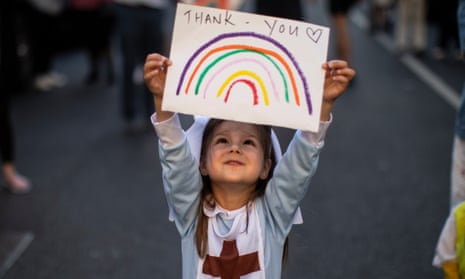In spring of last year, when the full severity of the pandemic began to get clearer, it became common to claim that we were all in the same boat (as Madonna also explained to us from a video taken in her bathtub, since deleted). Today, conventional wisdom would suggest that the Covid crisis has actually demonstrated the opposite: the stubborn persistence of inequalities. Rather than all of us being in the same boat, it turned out that some quickly drowned, some have been rowing frantically just to stay alive, and some were never in our boat to begin with; instead, we watched them sail off on their luxury yachts.
It is notable that few leftwing parties seem to have been strengthened by the pandemic. In Germany, where federal elections with likely far-reaching implications are scheduled for September, Social Democrats are languishing in the polls; their rivals to the left, Die Linke, are actually declining. Perhaps people just want to forget about the whole Covid nightmare as quickly as possible. It may be that voters take the return of some kind of day-to-day normality as reason to re-legitimate the old political regime: if I can go on holidays this summer, or so the reasoning might go, I just won’t vote for any radicals.
But that political defeatism is a bit too quick. No crisis automatically delivers its own lessons to citizens. After the 2009 financial crisis, progressives and leftwingers took it for granted that they would get an electoral boost – without really having to make their case or offering anything particularly inspiring beyond “greed is bad.” In fact it turned out to be the Tea Party which succeeded in imposing its framing of the crisis – undeserving people took on too much debt, and the government is rewarding them with more cash – on a surprisingly large number of people.
So far, the Tea Parties of today – freedom means I don’t care if others get infected – are not gaining all that much traction. And there is still time to frame the global pandemic in a way that doesn’t amount to resigned re-acceptance of inequalities. The crucial political fact of the pandemic was that it cut through well-known class, ethnic and other distinctions and showed how problems can affect us all. We also learnt how we all depend on each other, for no-one can be entirely safe, as long as not everyone is protected.
Because of the lockdowns and restrictions – which were often entirely justified – normally secure people the world over learned what it feels like to lack access to certain goods and places. That is of course the reality of the poor every day, but for wealthy or relatively wealthy people it was a novel and chastening experience. Not being able to travel or socialize or participate in normal cultural life because of a virus is not so different, materially and psychologically, from not being able to do those things because you lack the means.
There was also an important generational aspect. While many old people – warehoused in under-regulated nursing homes and subject to existential fear – suffered particularly from the pandemic, younger generations also came to know novel hardships: they were lonely, bored, anxious, under-educated and often under-cared for.
Not that everyone suffered equally. It would be obscene to pretend that the privileged were in the same position as the most disadvantaged: the flipside of “let them eat cake” is “we were suffering too, that one time my favorite cake wasn’t available”. But we shouldn’t get too concerned about what could be called socioeconomic – as opposed to cultural – appropriation. No two lives of citizens in a democracy are ever exactly the same, and yet we expect political parties to construct platforms which appeal to people with very different life experiences.
In the 1940s, the British aristocrat who could retreat to his country home had a very different war from a worker fighting at the front. But the Labour Party managed to appeal to a collective sense of sacrifice and solidarity (and shared vulnerability) in order to legitimize the creation of the welfare state. More than 70 years later, the British people still enjoy the social democratic institutions – such as the National Health Service – that the Labour party was able to create in a fertile political environment where people had an acute sense of how they depended on each other.
What’s required is political imagination and an ability to shape narratives. The latter both make sense of collective experience and allow us to see a future in light of a shared past – as opposed to treating the pandemic as a black hole of memory, or as a period so strange that nothing can be learnt from it. Although, truth be told, that might not even be an option: if good people fail to offer an account of our era, more nefarious forces surely will.
Jan-Werner Mueller teaches at Princeton. His book Democracy Rules was recently released by Farrar, Straus, and Giroux in the US and by Allen Lane in the UK
